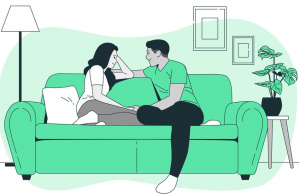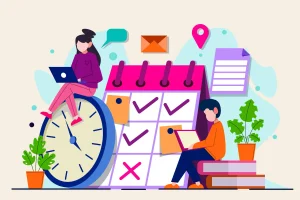Choosing the Right Counselor to Strengthen Your Relationship
By Prapoorna M
Last Updated: June 7, 2024
Choosing the right counselor for your relationship is one of the most important decisions you and your partner can make to strengthen your bond. Whether you’re looking to resolve conflicts, improve communication, or rekindle intimacy, finding the right counselor who understands your unique needs can make a world of difference.
Navigating the sea of options and selecting the right relationship counselor can feel daunting. With so many different specialties, approaches, and qualifications to consider, it’s easy to feel overwhelmed. But don’t worry, you’re not alone. In this article, we’ll guide you through the process of choosing the right counselor to strengthen your relationship.
Understanding the Role of Relationship Counselors
When it comes to improving and strengthening your relationship, understanding the role of a relationship counselor is key. A relationship counselor is a trained professional who helps couples navigate various challenges, enhance their communication skills, and foster intimacy. Here’s a closer look at the goals and different types of relationship counselors.
Definition and Goals of Relationship Counseling
Relationship counseling, also known as couples therapy or marriage therapy, is a process where couples work with a trained therapist to address challenges and enhance their relationship. The primary goals of relationship counseling include:
- Improved Communication: Helping couples express themselves more clearly and listen actively to their partner’s needs.
- Conflict Resolution: Teaching strategies for resolving disagreements in a healthy and constructive manner.
- Rebuilding Intimacy: Strengthening emotional and physical intimacy in the relationship.
- Providing a Safe Space: Offering a non-judgmental environment where couples can discuss sensitive issues openly.
Types of Relationship Counselors
Different types of professionals specialize in relationship counseling. Here’s an overview of the most common types:
- Marriage and Family Therapists (MFTs):
MFTs are licensed professionals with specialized training in helping couples and families. They are equipped to handle relationship issues, family dynamics, and parenting challenges. - Licensed Professional Counselors (LPCs):
LPCs are mental health professionals who are trained to provide therapy for individuals and couples. They offer support in addressing relationship challenges, communication issues, and emotional well-being. - Psychologists Specializing in Couples Therapy:
Clinical psychologists often specialize in couples therapy, bringing their expertise in mental health to help couples address deep-rooted challenges. - Licensed Clinical Social Workers (LCSWs):
LCSWs can provide counseling services to couples and families. They often take a holistic approach, considering both individual and relationship dynamics.
Finding the Right Counselor
Finding the right relationship therapist or counselor is crucial to ensuring a positive outcome. While the different types of counselors may vary in their approaches, all share a common goal: to support you and your partner in building a healthier relationship.
To explore further about how counseling can impact your relationship, you can check out the following articles from Wellness Hub:
- Steps to Prepare for Marriage Counseling: A Simple Guide
- How to Handle Communication Issues in Your Marriage
- What to Expect During a Marriage Counseling Retreat
When to Consider Relationship Counseling
Wondering if it’s time to seek help for your relationship? Recognizing the signs early on can prevent issues from escalating and help you and your partner build a healthier, more fulfilling connection. Here are some common signs that it’s time to consider relationship counseling:
Signs It’s Time to Seek Help
- Communication Issues:
- Constant misunderstandings, arguments, or a lack of meaningful conversations.
- Feeling like your partner doesn’t listen or understand you.
- Recurrent Conflicts and Unresolved Arguments:
- Finding yourselves stuck in a cycle of the same arguments without resolution.
- Conflicts that leave you feeling drained and distant from each other.
- Infidelity and Trust Issues:
- Betrayal due to infidelity or secrecy can deeply damage trust.
- Struggling to rebuild trust and move forward together.
- Intimacy Problems:
- Diminished emotional or physical intimacy.
- Feeling like roommates rather than romantic partners.
- Life Transitions Affecting the Relationship:
- Major life changes, such as becoming parents, changing careers, or dealing with illness, can strain your relationship.
- Struggling to adapt to new roles or expectations.
How to Choose the Right Counselor for Your Relationship
Finding the right counselor for your relationship is crucial to ensuring a successful therapy journey. Here’s a step-by-step guide to help you make the best choice:
1. Define Your Goals
- Identify Issues to Work On and Set Goals:
Before starting your search, discuss with your partner what specific issues you’d like to address and set goals together.- Do you need help with communication, conflict resolution, or intimacy?
- Are you looking to rebuild trust after infidelity or improve your overall connection?
- Consider Medication or Specific Therapy Styles:
Determine if medication or a specific therapy style could be beneficial. Examples include:- Cognitive Behavioral Therapy (CBT): Useful for identifying and changing negative thought patterns.
- Emotionally Focused Therapy (EFT): Focuses on rebuilding emotional bonds.
- Gottman Method: Enhances relationship positivity through research-based interventions.
2. Check Credentials and Experience
- Verify Educational Background and Certifications:
Look for counselors with relevant degrees and certifications:- Marriage and Family Therapists (MFTs): Licensed and trained specifically in couples therapy.
- Board-Certified Psychologists: Specialize in couple and family psychology.
- Licensed Professional Counselors (LPCs): Offer therapy for individuals and couples.
- Look for Board-Certified Psychologists or Licensed Marriage and Family Therapists:
Ensure that your potential counselor is certified or licensed in couples therapy.
3. Seek Recommendations
- Ask Trusted Friends, Family, or Healthcare Professionals:
Personal recommendations from people you trust can point you in the right direction. - Utilize Digital Directories:
Use online resources like:
4. Research Therapeutic Approaches
- Different therapists specialize in different approaches. Research these to find the best fit for your relationship:
- Gottman Method: Focuses on positive interactions and avoiding destructive behaviors.
- Emotionally Focused Therapy (EFT): Helps couples identify and express emotions for better attachment.
- Imago Therapy: Emphasizes healing childhood wounds to improve current relationships.
- Solution-Focused Therapy: Sets goals based on identifying what works well.
- Cognitive Behavioral Therapy (CBT): Addresses negative thoughts and behaviors.
Comparison of Therapeutic Approaches
| Approach | Focus/Goal | Useful For |
|---|---|---|
| Gottman Method | Focuses on positive interactions, reducing conflict. Utilizes research-based techniques to foster a stronger emotional connection between partners. | – Communication issues – Trust rebuilding – Conflict resolution |
| Emotionally Focused Therapy (EFT) | Rebuilds emotional bonds through identifying and transforming negative interaction patterns. Emphasizes creating secure emotional attachment between partners. | – Intimacy problems – Attachment issues – Emotional disconnection |
| Imago Therapy | Emphasizes healing childhood wounds and past trauma that impact current relationships. Helps couples develop empathy and understanding through effective communication exercises. | – Conflict resolution – Trust rebuilding – Emotional intimacy |
| Solution-Focused Therapy | Encourages practical goal setting and finding strengths to create positive change. Focuses on what works well in the relationship rather than problems. | – Building positivity – Goal setting – Conflict resolution |
| Cognitive Behavioral Therapy (CBT) | Addresses and changes negative thought patterns that affect behavior. Helps couples identify cognitive distortions and develop healthier communication strategies. | – Communication issues – Emotional regulation – Behavioral changes |
5. Ask Questions Before Committing
- During an initial consultation, ask questions to understand the counselor’s approach and philosophy:
- What is your experience working with couples?
- How do you handle secrets?
- What is your approach to relationship counseling?
6. Trust Your Instincts and Comfort Level
- Compatibility Matters:
Initial consultations help assess rapport and compatibility with your potential therapist. - Ensure a Safe, Supportive, and Confidential Environment:
Your therapist should provide a space where both partners feel heard, respected, and supported.
Practical Considerations: Budget, Insurance, and Accessibility
When choosing the right counselor for your relationship, practical considerations like budget, insurance, and accessibility play a significant role. Here’s a guide to help you navigate these aspects:
1. Insurance and Finances
- Check Your Insurance Plan for Mental Health Coverage:
Review your health insurance policy to understand what mental health services it covers. Some plans cover couples therapy, while others may have restrictions.- Contact your insurance provider for a list of in-network therapists.
- Confirm the number of sessions covered and your co-pay requirements.
- Explore Sliding Scale Fees, Community Resources, and Training Programs:
If your insurance doesn’t cover couples therapy or you’re uninsured, consider these options:- Sliding Scale Fees: Many therapists offer reduced rates based on your income.
- Community Resources: Local organizations may provide free or low-cost counseling.
- Training Programs: University clinics often have student counselors under supervision offering services at a reduced cost.
2. Availability and Accessibility
- Consider the Counselor’s Location and Availability:
Look for therapists who are conveniently located and whose schedules align with yours. For those with busy lives:- Check if the therapist offers evening or weekend sessions.
- Consider whether in-person or virtual sessions better suit your needs.
- Explore Online Counseling Options (e.g., Wellness Hub):
Online therapy has become increasingly popular, offering convenience and flexibility.- Wellness Hub provides teletherapy services, allowing you to receive counseling from the comfort of your home.
Preparing for Your First Session
You’ve chosen the right counselor for your relationship, and now it’s time to prepare for your first session. Making sure you’re both ready can help you make the most of your therapy journey.
1. Clarify Goals and Expectations
- Reflect on Your Concerns and Goals:
Take some time to identify the primary concerns and issues you want to address in therapy. Ask yourselves:- What challenges are we currently facing?
- What areas of our relationship need improvement?
- What outcomes do we hope to achieve through counseling?
- Discuss Expectations with Your Partner:
Have an open conversation about what each of you expects from therapy.- What are your goals as a couple?
- How can you both support each other throughout the process?
2. Gather Relevant Information
- Note Specific Incidents or Events for Discussion:
If there are specific incidents or recurring patterns affecting your relationship, write them down.- Examples:
- Frequent arguments about finances or parenting
- Trust issues stemming from past betrayals
- Changes in intimacy or emotional connection
- Examples:
3. Keep an Open Mind and Commit
- Approach Therapy with Openness and Patience:
Therapy is a journey that requires openness, patience, and a willingness to explore new perspectives.- Be receptive to the therapist’s guidance and suggestions.
- Allow room for self-reflection and growth.
- Commit to Regular Sessions for the Best Outcomes:
Consistency is key to achieving positive results in therapy.- Agree on a regular schedule for sessions.
- Follow through with any exercises or discussions suggested by your therapist.
Final Thoughts: Finding the Right Counselor for a Stronger Relationship
Finding the right counselor for your relationship requires time and effort, but it’s a worthwhile investment for a stronger partnership. By carefully selecting a counselor who understands your unique needs, you and your partner can embark on a journey toward improved communication, intimacy, and mutual understanding.
Key Takeaways:
- Invest Time and Effort in Finding the Right Counselor:
A relationship counselor can only be effective if both partners trust and feel comfortable with them.- Take time to research and ask the right questions during the initial consultation.
- Prioritize therapists who specialize in your specific relationship challenges.
- Trust Your Instincts and Prioritize Effective Communication:
Your counselor should create a safe space where both partners feel heard and respected.- Trust your instincts during your search and choose a therapist with whom you both feel at ease.
- Open communication with your partner and therapist is crucial throughout the therapy journey.
- Consider Wellness Hub for Relationship Counseling Support:
Wellness Hub offers online counseling services to help couples navigate challenges and build a healthier relationship.- Our platform connects you with licensed therapists specializing in couples therapy, communication issues, and more.
Conclusion
Finding the right counselor for your relationship can be a transformative step toward a stronger partnership. By defining your goals, researching potential therapists, and asking the right questions, you can identify a counselor who aligns with your values and understands your unique needs. Remember, investing time and effort in this search will help you and your partner build a healthier, happier relationship.
If you’re seeking guidance, Wellness Hub offers online counseling services to help couples navigate challenges and strengthen their connection. Our licensed therapists specialize in relationship issues like communication, intimacy, and trust. Take the first step toward a better relationship today by finding the right counselor for your journey.
Frequently Asked Questions:
1. How do I choose the right counselor for my relationship?
Choosing the right counselor involves defining your relationship goals, researching different therapists’ credentials and approaches, and asking key questions during an initial consultation. It’s crucial to find a therapist with whom both you and your partner feel comfortable.
2. What should I look for in a relationship counselor?
Look for a relationship counselor with the appropriate credentials (e.g., Licensed Marriage and Family Therapist or Board-Certified Psychologist) and experience working with couples. Ensure their therapeutic approach aligns with your goals and that they create a supportive, non-judgmental environment.
3. When is the right time to start marriage counseling?
The best time to start marriage counseling is as soon as you recognize recurring patterns of conflict or disconnection that you can’t resolve on your own. Don’t wait until problems become deeply ingrained or love and goodwill run out.
4. How do I know if we need couples therapy?
Couples therapy can be beneficial if you’re experiencing communication issues, recurrent conflicts, intimacy problems, or trust issues. It’s also helpful if life transitions like parenting or career changes are affecting your relationship.
5. Can my insurance cover couples therapy?
Some health insurance plans cover couples therapy, but coverage varies. Check with your insurance provider about your plan’s mental health benefits and whether couples therapy is included. You may also explore sliding scale fees or community resources for affordable counseling.
6. What therapeutic approaches are best for relationship counseling?
Common approaches include:
- Gottman Method: Focuses on positive interactions.
- Emotionally Focused Therapy (EFT): Rebuilds emotional bonds.
- Imago Therapy: Heals childhood wounds affecting current relationships.
- Solution-Focused Therapy: Identifies strengths and sets practical goals.
- Cognitive Behavioral Therapy (CBT): Addresses negative thought patterns.
7. What can I expect in my first marriage counseling session?
In your first session, the therapist will typically ask about your relationship history, current challenges, and goals for therapy. Both partners will have the opportunity to share their perspectives, and the therapist will outline the therapeutic process.
8. What should I do if my partner won’t go to couples therapy?
Lead by example and consider attending therapy individually to work on personal growth. A professional therapist can provide guidance and strategies to encourage your partner to join counseling.
9. How can Wellness Hub help with relationship counseling?
Wellness Hub offers online counseling services with licensed therapists specializing in couples therapy. We help couples navigate communication issues, intimacy problems, trust concerns, and more to build healthier, happier relationships.
10. How many counseling sessions do couples typically need?
The number of counseling sessions varies depending on the complexity of the issues and the goals of each couple. On average, couples may benefit from 8 to 12 sessions. However, some couples may need fewer or more sessions based on their unique circumstances and progress.
About the Author:
Prapoorna Mangalampalli
M.Sc., M.A., (Dual Masters in Psychology & English) – Counselor (6+ years of experience)
Prapoorna armed with a passionate dedication fueled by dual Master’s degrees in Psychology and English, Prapoorna sheds light on and elevates human experiences. Over 6+ years of experience fuel her insightful approach to counseling, offering profound empathy and guidance across diverse areas like online, marital, relationship, child, family, and career counseling.
At Wellness Hub, she thrives in a team environment that values innovation, compassion, and achieving results for their clients.
Connect with Prapoorna to learn how she can help you or your loved one find their voice and build a brighter future.
Book your Free Consultation Today
Parent/Caregiver Info:
Client’s Details:
* Error Message









